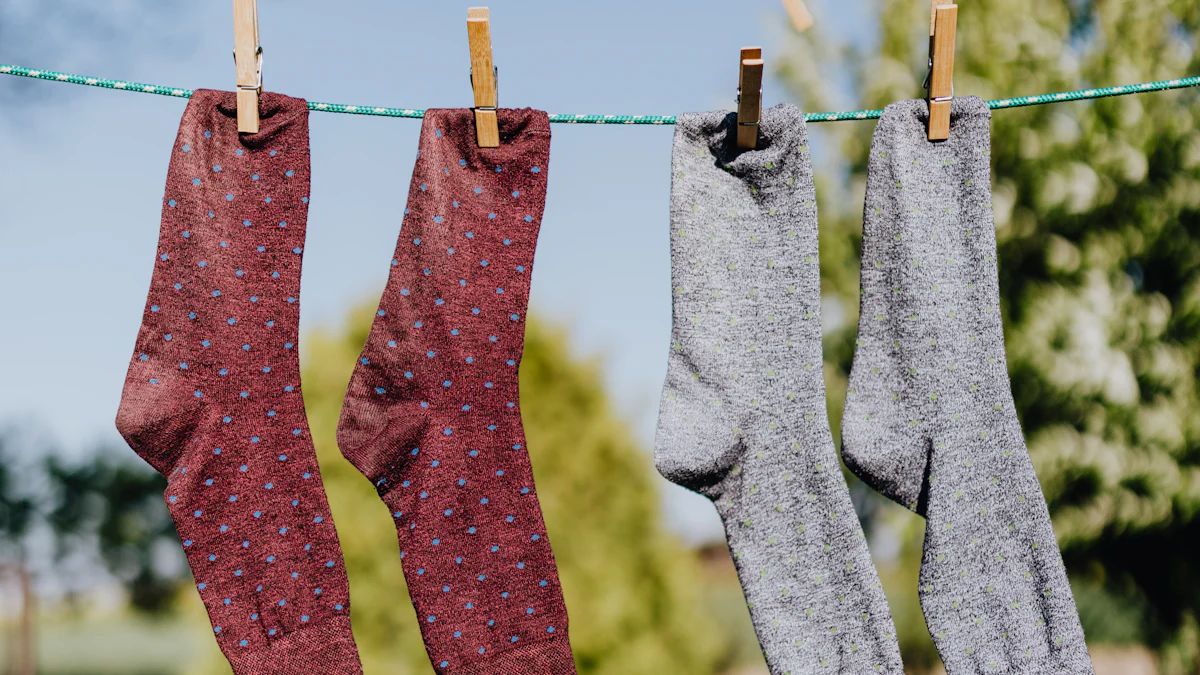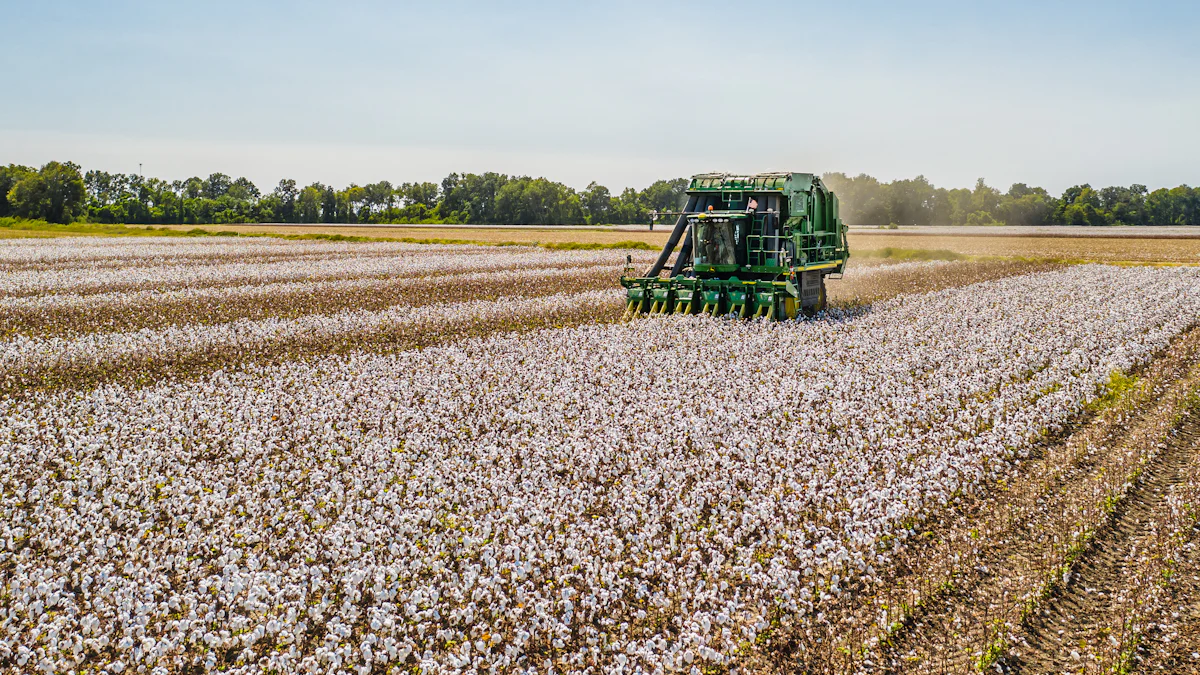
Organic cotton knee socks offer a healthier alternative to conventional options. The production of organic cotton has seen significant growth, with a 31% increase in the 2019/20 harvest year. This rise reflects a growing awareness of the health and environmental benefits associated with organic products. Organic cotton farming reduces the use of synthetic chemicals, which helps prevent water contamination and soil degradation. These socks provide comfort and breathability, making them ideal for everyday wear. Choosing cotton knee socks supports sustainable practices and promotes overall well-being.
Understanding Organic Cotton

What is Organic Cotton?
Definition and Characteristics
Organic cotton is cultivated using methods that prioritize ecological harmony. Farmers avoid synthetic chemicals, pesticides, and genetically modified organisms (GMOs). Instead, they rely on natural processes, crop rotation, and biological pest control. This approach nurtures the cotton plants without harming the environment.
Organic cotton offers several benefits. It maintains soil fertility and promotes biodiversity. The absence of synthetic chemicals ensures that the cotton remains free from harmful substances. This makes organic cotton a healthier choice for both consumers and the planet.
How it Differs from Conventional Cotton
Conventional cotton farming often involves heavy use of synthetic pesticides and fertilizers. These chemicals can contaminate water sources and degrade soil quality. In contrast, organic cotton farming avoids these harmful practices. Farmers use natural fertilizers and compost to enrich the soil. Biological pest control methods replace synthetic pesticides.
Organic cotton also requires less water compared to conventional cotton. This conservation effort helps protect valuable water resources. Additionally, organic cotton farming does not involve GMOs, ensuring a more natural product.
Environmental Benefits
Reduced Chemical Use
Organic cotton farming eliminates the need for synthetic chemicals. This practice prevents toxic runoff into rivers and lakes. The absence of harmful pesticides and herbicides keeps drinking water safe. Healthier soil results from the use of natural fertilizers and compost. This method supports sustainable agriculture and protects ecosystems.
Sustainable Farming Practices
Organic cotton farming emphasizes sustainability. Farmers use crop rotation to maintain soil fertility. This practice reduces the need for chemical fertilizers. Biological pest control methods help manage pests without synthetic pesticides. These techniques promote a balanced ecosystem.
Sustainable farming practices also support biodiversity. Organic cotton fields often host a variety of plants and animals. This diversity helps create a resilient agricultural system. Organic cotton farming contributes to long-term environmental health.
Health Benefits of Organic Cotton Knee Socks

Hypoallergenic Properties
Reduced Skin Irritation
Organic cotton knee socks offer significant hypoallergenic properties. The absence of synthetic chemicals in organic cotton reduces the risk of skin irritation. Conventional cotton often contains residues from pesticides and dyes. These substances can cause itching and rashes. Organic cotton remains free from these harmful chemicals. This purity makes cotton knee socks a safer option for those with sensitive skin.
Ideal for Sensitive Skin
People with sensitive skin benefit greatly from organic cotton knee socks. The natural fibers in organic cotton provide a soft and gentle touch. This softness minimizes friction against the skin. Many dermatologists recommend organic cotton for individuals with eczema or dermatitis. The hypoallergenic nature of organic cotton ensures comfort and safety. Cotton knee socks made from organic materials prove ideal for maintaining healthy skin.
Breathability and Comfort
Moisture-Wicking Abilities
Organic cotton knee socks excel in breathability. The natural fibers allow air to circulate freely. This circulation helps wick away moisture from the skin. Feet stay dry even during intense physical activities. Moisture-wicking abilities prevent the buildup of sweat. This feature reduces the risk of fungal infections. Cotton knee socks that breathe well enhance overall foot health.
Temperature Regulation
Temperature regulation is another key benefit of organic cotton knee socks. Organic cotton adapts to different weather conditions. In warm weather, the fibers keep feet cool by allowing heat to escape. During colder months, organic cotton retains warmth. This adaptability ensures comfort throughout the year. Cotton knee socks made from organic materials provide a balanced temperature for the feet.
Durability and Longevity
Long-Lasting Material
Organic cotton knee socks offer impressive durability. The natural fibers withstand wear and tear better than synthetic materials. Regular use does not compromise the integrity of the fabric. Many users report that organic cotton socks last longer than conventional ones. The long-lasting nature of organic cotton makes it a cost-effective choice. Cotton knee socks crafted from organic fibers maintain their quality over time.
Cost-Effectiveness Over Time
Investing in organic cotton knee socks proves cost-effective in the long run. The initial price may be higher compared to conventional socks. However, the extended lifespan of organic cotton offsets this cost. Fewer replacements mean lower expenses over time. Additionally, the health benefits reduce potential medical costs related to skin issues. Cotton knee socks made from organic materials offer both economic and health advantages.
Ethical and Social Considerations
Fair Trade Practices
Supporting Ethical Labor
Organic cotton production supports ethical labor practices. Farmers and factory workers receive fair wages. Safe working conditions ensure the well-being of all involved. Many fashion brands and retailers embrace organic cotton for sustainability. This commitment leads to higher income for producers. Ethical labor practices promote social justice in the textile industry.
Community Benefits
Fair trade practices extend benefits to entire communities. Organic cotton farming often involves local communities. This engagement fosters economic growth in rural areas. Farmers invest in education and healthcare with fair wages. Improved living standards result from these investments. Organic cotton production strengthens community bonds.
Animal Welfare
Cruelty-Free Production
Organic cotton knee socks adhere to cruelty-free principles. The production process avoids animal testing. Synthetic chemicals and pesticides harm wildlife. Organic farming methods protect animals and their habitats. Consumers can trust that no animals suffer during production. Cruelty-free products align with ethical consumer choices.
Vegan-Friendly Options
Organic cotton knee socks offer vegan-friendly options. The absence of animal-derived materials ensures suitability for vegans. Many consumers seek products that align with their values. Organic cotton meets this demand without compromising quality. Vegan-friendly options provide a compassionate choice for consumers. Organic cotton knee socks support a lifestyle free from animal exploitation.
Cotton knee socks made from organic materials offer numerous health benefits. These socks reduce skin irritation and provide comfort for sensitive skin. The breathability and moisture-wicking abilities enhance foot health. Organic cotton ensures durability, making cotton knee socks a cost-effective choice.
Environmental and ethical advantages also make cotton knee socks appealing. Organic farming practices conserve water and protect ecosystems. Ethical labor practices support fair wages and community growth. Cruelty-free and vegan-friendly options align with compassionate consumer choices.
Switching to cotton knee socks promotes personal health and environmental sustainability. Choose cotton knee socks for a healthier lifestyle and a better planet.

